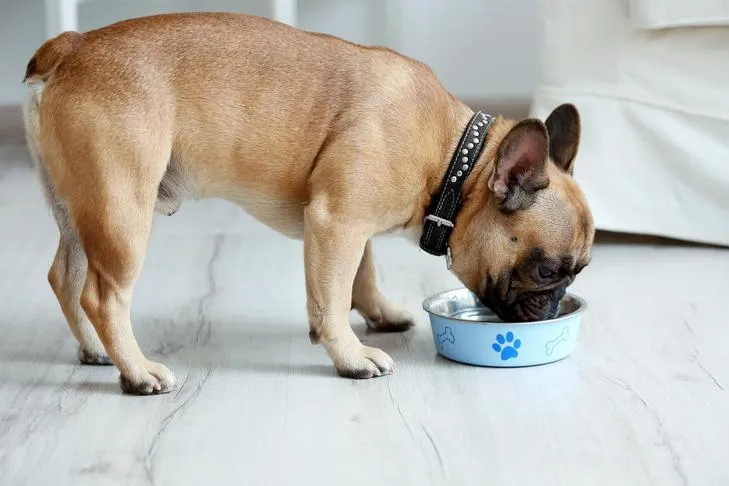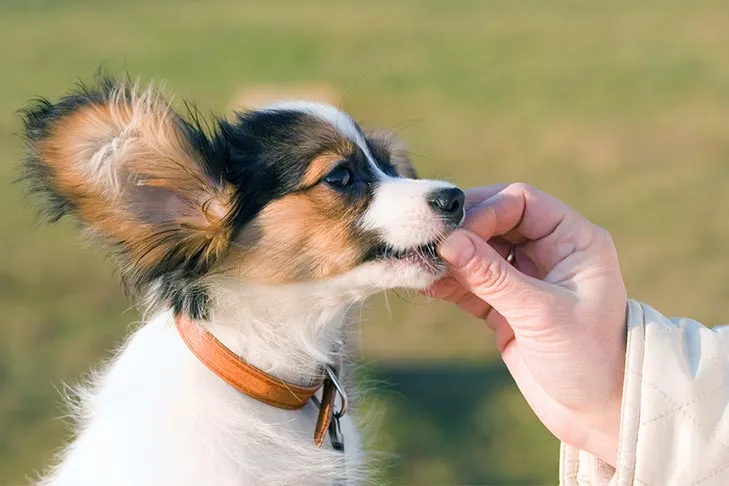As a loving pet owner, you’ve probably wondered, “What Can Dogs Have To Eat” from your own plate. Sharing meals with your canine companion can be a bonding experience, but it’s crucial to distinguish between safe and dangerous human foods. While some human foods offer beneficial nutrients and make excellent treats, others can cause serious health issues or even be fatal. Understanding which foods are safe and how to prepare them properly is key to ensuring your dog’s well-being and avoiding unnecessary vet visits. This guide will walk you through a detailed list of human foods that dogs can safely enjoy in moderation, along with important precautions to keep them healthy. For situations where your dog shows reluctance to eat, understanding options can be vital, so consider learning about what can you give a dog that refuses to eat.
Safe Human Foods for Dogs: A Detailed List
Integrating human foods into your dog’s diet should always be done thoughtfully and in moderation. These items are best served as occasional treats rather than staples, complementing a balanced dog food diet.
Bread
Small quantities of plain bread are generally harmless for dogs, provided it is free of spices, especially garlic or onion powder, and absolutely no raisins. While it won’t offer significant health benefits or nutritional value, it’s safe as an occasional treat. Homemade bread is a better choice than store-bought options, which often contain unnecessary preservatives. However, due to its carbohydrate and calorie content, similar to humans, it’s best to offer it sparingly.
Cashews
Cashews can be given to dogs in small amounts. These nuts provide beneficial nutrients such as calcium, magnesium, antioxidants, and proteins. Nevertheless, cashews are relatively high in fat, and overfeeding can lead to weight gain. Always ensure cashews are unsalted, as excessive sodium is detrimental to a dog’s health. A few unsalted cashews can serve as a delightful, occasional treat.
Cheese
Most dogs can enjoy cheese in small to moderate portions. While rare, some dogs may be lactose intolerant, so observe your pet for any digestive upset after consumption. Cheese can be a highly palatable treat for many canines. Opt for lower-fat varieties like cottage cheese or mozzarella to prevent excessive fat intake. Many dogs also enjoy specialized dried cheese chews, such as Himalayan dog chews.
 All American Dog resting its head on the kitchen table looking at cheese.
All American Dog resting its head on the kitchen table looking at cheese.
Coconut
This versatile fruit contains lauric acid, an ingredient known for its potential to help combat bacteria and viruses. Coconut can also contribute to fresher breath and may assist in clearing up various skin conditions, including hot spots, flea allergies, and general itchy skin. Both coconut milk and coconut oil are safe for canine consumption. However, it’s imperative to remove the fibrous outer shell, as it can pose a choking hazard or cause internal blockages if ingested.
Corn
Corn is a widely used ingredient in many commercial dog foods due to its nutritional profile. It is perfectly safe for dogs to eat, but a critical distinction must be made: always serve corn off the cob. The cob itself is incredibly difficult for dogs to digest and can easily cause an intestinal blockage, which often requires emergency veterinary intervention. A small amount of plain, cooked corn kernels can be a sweet and crunchy treat. If you have a particularly fussy eater, understanding what should i feed my picky dog might provide further valuable insights.
Eggs
Fully cooked eggs are an excellent addition to a dog’s diet. They are a fantastic source of protein and can be particularly soothing for dogs with an upset stomach. It is crucial to cook eggs thoroughly, as raw egg whites contain avidin, an enzyme that can interfere with biotin absorption, potentially leading to a biotin deficiency over time. Always ensure eggs are cooked plain, without any added salt, butter, or seasonings.
Fish
Fish offers a significant health boost for dogs, providing beneficial fats and essential amino acids. Salmon and sardines are particularly noteworthy for their nutritional value. Salmon is rich in vitamins and protein, while sardines contain soft, digestible bones that contribute extra calcium. With the exception of sardines, it is absolutely essential to meticulously remove all tiny bones from any fish before feeding it to your dog, as they can splinter and cause internal injury. Never feed your dog uncooked or undercooked fish, as it can contain harmful parasites. Fish should be fully cooked and cooled, and intake should be limited to no more than twice a week to maintain a balanced diet.
Ham
While a small piece of ham won’t typically harm your dog, it is not the healthiest option for regular consumption. Ham is notably high in both sodium and fat, which can contribute to weight gain and other health issues if given frequently. An occasional, small, plain piece, free of bones, excessive fat, and seasonings, is generally acceptable as a rare treat.
 French Bulldog eating from a bowl at home.
French Bulldog eating from a bowl at home.
Honey
Honey is a nutrient-dense food, brimming with vitamins such as A, as well as essential minerals like potassium, calcium, magnesium, and copper, alongside valuable antioxidants. Feeding dogs small amounts of local honey may even assist with allergies by gradually introducing small quantities of local pollen to their system, potentially building immunity. Beyond consumption, the sticky consistency of honey can also be utilized as a topical treatment for minor burns and superficial cuts, offering soothing and antibacterial properties.
Milk
Dogs can drink milk, but caution is advised. Many dogs are lactose intolerant to varying degrees, meaning they may not digest milk well and could experience digestive upset, such as diarrhea or gas. While a small amount of milk might be fine for some, owners should be vigilant for any signs of intolerance. For hydration, water remains the safest and best option for all dogs. If you do offer milk, ensure it’s plain and cow’s milk.
Peanut Butter
Peanut butter can be an excellent source of protein for dogs, packed with heart-healthy fats, B vitamins, vitamin E, and niacin. The healthiest option is raw, unsalted peanut butter. However, it is critically important to read the label carefully to ensure the peanut butter does not contain xylitol. Xylitol is a sugar substitute found in many sugar-free products and is highly toxic to dogs, capable of causing a rapid drop in blood sugar and liver failure.
Peanuts
Unlike some other nuts (such as almonds, which are not recommended), plain peanuts are safe for dogs to eat. They are rich in good fats and proteins, offering nutritional benefits for your canine. As with cashews, moderation is key due to their fat content, as too much can potentially lead to pancreatic issues. Always choose unsalted, plain peanuts, as excessive salt intake is difficult for dogs to process and can lead to sodium poisoning.
Popcorn
Unsalted, unbuttered, air-popped popcorn is acceptable for dogs in moderation. It contains beneficial nutrients such as riboflavin and thiamine, which contribute to eye health and proper digestion, along with small amounts of iron and protein. It is crucial to ensure that all kernels are fully popped before offering them to your dog, as unpopped kernels can pose a significant choking hazard or cause dental damage.
 Samoyed puppy laying in the grass outdoors.
Samoyed puppy laying in the grass outdoors.
Pork
Pork is a highly digestible protein source, abundant in amino acids essential for canine health. While it contains more calories per pound compared to some other meats, it can be a valuable part of a dog’s diet. Interestingly, pork may also be less likely to trigger allergic reactions in some pets compared to more common proteins. Always serve pork fully cooked and plain, ensuring all bones are removed, and avoid heavily seasoned or processed varieties. For those exploring diverse dietary options for their pets, considering what can dogs eat on a raw diet can open up new discussions.
Quinoa
Quinoa, a complete protein, has gained popularity in human diets and is now increasingly found in some high-quality dry dog foods. Its robust nutritional profile makes it a healthy and beneficial alternative to traditional starches like corn, wheat, and soy, which are often used as fillers in kibble. When preparing quinoa for your dog, ensure it is cooked thoroughly and served plain.
Salmon
As reiterated from the general fish section, fully cooked salmon stands out as an excellent source of protein, healthy fats, and essential amino acids. It plays a significant role in promoting joint health, supporting brain function, and boosting the canine immune system. However, the importance of cooking salmon thoroughly cannot be overstated. Raw or undercooked salmon harbors parasites that can cause Salmon Poisoning Disease in dogs, leading to severe symptoms like vomiting, diarrhea, dehydration, and in extreme cases, even death. Proper cooking eliminates these dangerous parasites.
Shrimp
A few shrimp given occasionally can be a healthy treat for your dog, but strict preparation is necessary. Shrimp must be fully cooked, and crucially, the entire shell—including the tail, head, and legs—must be completely removed. Shrimp are rich in antioxidants, vitamin B-12, and phosphorus, while being commendably low in fat, calories, and carbohydrates, making them a nutritious snack in moderation.
Tuna
Dogs can consume tuna, but only in very small amounts and with specific considerations. In moderation, cooked, fresh tuna is an excellent source of omega-3 fatty acids, which are vital for promoting heart and eye health. When it comes to canned tuna, be aware that it contains small amounts of mercury and sodium. Therefore, a little bit of canned tuna (prepared only in water, not oil, and without added spices) and tuna juice offered infrequently is acceptable, but excessive consumption should be avoided due to potential accumulation of mercury and high sodium levels.
Turkey
Turkey is a safe and lean protein source for dogs, provided it is prepared correctly. It is essential to remove all excess fat and skin from the meat before serving, as these can be difficult to digest or too rich. Furthermore, always check meticulously for bones, as poultry bones are prone to splintering during digestion, which can lead to blockages or even internal tears in the intestines. Avoid any turkey that has been seasoned heavily with salt, onions, or garlic, as these ingredients are harmful to dogs. For specific breeds with unique dietary requirements, such as a Maltese, understanding what food can a maltese dog eat can be very helpful.
Wheat or Grains
Contrary to popular belief, not all dogs need a grain-free diet. In fact, grains like wheat and corn can be excellent sources of protein, essential fatty acids, and fiber, contributing positively to a dog’s overall health. Unless your dog has a diagnosed allergy or specific sensitivity to grains, there is no inherent need to avoid them. If you suspect your dog has certain allergies, it is always best to consult your veterinarian for personalized dietary recommendations.
Yogurt
Plain yogurt can be a perfectly acceptable and healthy snack for dogs. However, similar to milk, some dogs may have difficulty digesting dairy products. If your dog tolerates it well, the active bacteria found in plain yogurt can help strengthen their digestive system by providing beneficial probiotics. It is crucial to choose only plain yogurt and to avoid any varieties with added sugar or, more critically, artificial sweeteners like xylitol, which is highly toxic to dogs.
 Papillon puppy gently taking a treat from a hand.
Papillon puppy gently taking a treat from a hand.
Foods Your Dog Should NEVER Eat
While this guide focuses on safe human foods, it is equally, if not more, important to be aware of foods that are dangerous or toxic to dogs. Some common human foods can cause severe illness, organ damage, or even be fatal. Always keep foods like chocolate, grapes, raisins, onions, garlic, avocado, macadamia nuts, and any products containing xylitol away from your dog. If you ever suspect your dog has ingested a toxic substance, consult your veterinarian or an emergency animal hospital immediately. Understanding what meat is toxic for dogs is particularly important for pet owners who share food.
Conclusion
Understanding what human foods your dog can safely eat is an important part of responsible pet ownership. While many common household foods can offer nutritional benefits and make delightful treats, the keys are always moderation, proper preparation, and awareness of potential risks. Always introduce new foods slowly and in small quantities, observing your dog for any adverse reactions. When in doubt about a particular food or if your dog has specific dietary needs or health conditions, consulting your veterinarian is always the best course of action. Their professional advice will help ensure your canine companion enjoys a safe, healthy, and happy diet. For more detailed information on specific dietary needs or concerns, always consult your veterinarian or explore our other articles on Dog Care Story.
